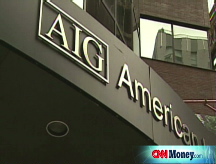Recession fear batters Wall Street
Stocks retreat on worries about corporate health amid the global economic slowdown.
NEW YORK (CNNMoney.com) -- Stocks slumped Monday, as ongoing recession fears overshadowed any relief about China's $586 billion stimulus plan and the government's revamping of its deal with AIG.
The Dow Jones industrial average (INDU) lost 0.8%. The Standard & Poor's 500 (SPX) index lost 1.3% and the Nasdaq composite (COMP) shed 1.9%.
All three major gauges had risen in the early going, before abandoning gains and turning lower.
Monday brought plenty of corporate news, including AIG's loan restructuring, Circuit City's bankruptcy and more weakness for the automakers.
"When the top companies are giving the kind of guidance they're giving and announcing layoffs, that tells you we are looking at at least a few more quarters of this recession," said John Wilson, chief technical strategist at Morgan Keegan.
In global news, China announced a $586 billion stimulus package, aimed at tempering the impact of the global financial crisis.
"I think right now the market is grappling with the length and the duration of the recession," said Wilson.
Stocks fell last week but managed to gain Friday despite a brutal October jobs report and GM's massive quarterly loss.
After the close, Starbucks (SBUX, Fortune 500) reported weaker earnings and higher revenue, both of which missed estimates. Shares declined about 3% in extended-hours trading.
AIG and Fannie Mae: The federal government said Monday it was restructuring AIG's bailout plan, buying $40 billion in preferred stock, reducing its original $85 billion bridge loan to $60 billion, and cutting the interest rate by 5.5 percentage points. The total reworked deal is worth about $152.5 billion. The reworking acknowledges that the initial plan was insufficient to reverse AIG's slide.
Additionally, AIG reported a steep quarterly loss of $24.5 billion in the third quarter. Shares gained 8%.
Fannie Mae (FNM, Fortune 500), another company that nearly went under as a result of the subprime mortgage crisis, reported a steep quarterly loss of $29 billion. A large portion of the loss was due to a change in the way it accounted for tax credits. But even without that, results were far worse than a year ago, due to bad mortgage bets. In September, the government took over Fannie Mae and Freddie Mac. Shares fell 2.7%. (Full story)
Citigroup (C, Fortune 500) is reportedly in talks to buy an unnamed regional bank, in the aftermath of its failure to buy Wachovia (WB, Fortune 500) last month, according to The Wall Street Journal. Shares fell 5%.
A number of financial stocks fell, including American Express (AXP, Fortune 500), Goldman Sachs (GS, Fortune 500), Bank of America (BAC, Fortune 500) and Merrill Lynch (MER, Fortune 500).
Automakers: The companies continued to plunge amid worries about their ability to stay afloat without government intervention. General Motors (GM, Fortune 500) lost 23% and Ford (F, Fortune 500) lost 4.5%.
Both companies, along with Chrysler, are seeking help from the U.S. government. On Friday, GM posted a steep loss and said it is running out of cash.
Other company news: Package-delivery firm DHL became the latest corporation to announce massive layoffs. DHL said it will cut 9,500 jobs as it ends air and ground operations within the U.S., focusing only on deliveries between the U.S. and other nations. (Full story)
The recession has sparked layoffs in a number of industries, with the Labor Department reporting on Friday that the 2008 tally stands at 1.2 million.
Circuit City (CC, Fortune 500) said last week that it would cut 17% of its domestic workforce and close 150 stores amid the sluggish economy and consumer spending slowdown. On Monday, the company filed for bankruptcy protection. (Full story)
On the upside, McDonald's (MCD, Fortune 500) said worldwide sales at stores open a year or more jumped 8.2% in October, thanks to overseas consumers and demand for cheap food amid the recession. Shares gained 1.8%.
Telecom company Nortel Networks (NT) reported a quarterly loss versus a profit a year ago, and also said it was cutting 1,300 jobs. Shares fell 18.8%.
American Capital Strategies (ACAS) reported a quarterly loss and said it was suspending its dividend. The buyout firm also said it was buying the remaining 32.3% of European Capital it doesn't already own. Shares fell 43%.
Market breadth was negative. On the New York Stock Exchange, decliners beat advancers by more than two to one on volume of 1.14 billion shares. On the Nasdaq, losers topped winners by more than two to one on volume of 1.72 billion shares.
Other markets: In global trade, Asian markets ended higher, with Japan's Nikkei 225 up 5.8%. European markets posted smaller gains, with the London FTSE 100 rising 0.4%.
The dollar gained against the euro and fell versus the yen.
COMEX gold for December delivery rallied $11.40 to settle at $745.60 an ounce.
U.S. light crude oil for December delivery gained $1.37 to settle at $62.41 a barrel on the New York Mercantile Exchange.
Gasoline prices fell another 1.9 cents to a national average of $2.24 a gallon, according to a survey of credit-card activity released Monday by motorist group AAA. The decline marks the 54th consecutive day that prices have decreased. During that same time period, prices dropped by $1.61 a gallon, or 41.9%.
Lending rates: The credit market continued to improve. The 3-month Libor fell to 2.24% from 2.29% Friday, a nearly four-year low, according to Dow Jones. Overnight Libor inched higher to 0.35% from 0.33% Friday, after hitting an all-time low of 0.32% last week. Libor is a key interbank lending rate.
The yield on the 3-month Treasury bill, seen as the safest place to put money in the short term, inched lower to 0.21% from 0.26% Friday, with investors preferring to take a small return on their money rather than risk the stock market.
Treasury prices rose, lowering the yield on the benchmark 10-year note to 3.75% from 3.78% Friday. Treasury prices and yields move in opposite directions.
Did you vote for Obama? How do you think the new president will affect your wallet? What do you think Obama needs to do to fix the economy - both in the short run and the long term? What should be first on the new Congress's agenda? E-mail us your thoughts, including your name, photo and contact info; the best answers will be featured in an upcoming CNNMoney.com article. ![]()




